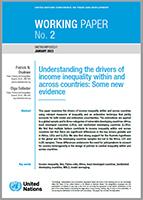
This paper examines the drivers of income inequality within and across countries using relevant measures of inequality and an estimation technique that jointly accounts for both model and estimation uncertainties.
The estimations are applied to a global sample and to three categories of vulnerable developing countries: Africa, least developed countries (LDCs), and landlocked developing countries (LLDCs).
We find that multiple factors contribute to income inequality within and across countries but that there are significant differences in the key drivers globally and in Africa, LDCs and LLDCs.
We also find strong support for the Kuznets hypothesis in the global and the developing countries samples but not in the Africa, LDC and LLDC samples.
These differences underscore the need for policymakers to account for country-heterogeneity in the design of policies to combat inequality within and across countries.
The findings, interpretations and conclusions expressed in this document are those of the author(s) and do not necessarily reflect the views of the United Nations or its officials or Member States.
The designations employed and the presentation of material on any map in this work do not imply the expression of any opinion whatsoever on the part of the United Nations concerning the legal status of any country, territory, city, or area or of its authorities, or concerning the delimitation of its frontiers and boundaries.


